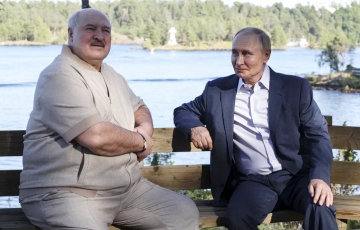Karbalevich: Putin And Lukashenka Have Never Had Such Closed Meeting
31- 28.07.2024, 22:05
- 65,364

There are some reasons for that.
The three-day talks between Aliaksandr Lukashenka and Vladimir Putin on the island of Valaam in northern Russia were held in an almost complete information vacuum. Valery Karbalevich explained in an article for Radio Liberty reasons for this sudden meeting in the middle of the summer vacation season.
On July 25, Lukashenka unexpectedly flew to Putin on Valaam, an island in the middle of Lake Ladoga in Karelia. They visited the monastery and then disappeared from the public space for almost a whole day. According to BelTA, Lukashenka and Putin "continued to communicate in a closed format." In the middle of the day on July 26, a short video and a photo of their walk appeared. The day of July 28 passed in a complete information vacuum.
There have been long three-days meetings between Lukashenka and Putin in the history of their bilateral relations between. The Russian ruler spares no time for negotiations with the Belarusian counterpart even strongly engaged in important state affairs.
But there was no such closed meeting. Journalists were not allowed even for the protocol photo at the beginning of the negotiations. Such a slightly unusual information secrecy may indicate the tense nature of the negotiations. There are some reasons for that.
Perhaps, for the first time since the beginning of Russia's war against Ukraine, a number of conflict nodes have accumulated in Belarusian-Russian relations that require resolution. The Russian president summoned Lukashenka for report — that is, to Valaam. At least listen to the explanations.
On July 13, Lukashenka visited a military base in the Luninets district and unexpectedly noted a cascade of peace-loving rhetoric about Ukraine, which has not been heard since the beginning of Russian aggression: "Now we have no complications with the Ukrainians. I hope there won't be any. We are not enemies for Ukrainians.” He announced the withdrawal of the Belarusian troops from the Ukrainian border.
The Russian leadership could not like this. In response, Russian Z-bloggers called Lukashenka a “traitor.” The Russian "shaheds" suddenly began to fly over Belarus. Many experts considered it a warning from Moscow.
The introduction of a "visa-free" regime for citizens of 35 European countries by Belarus could also cause discontent in Russia, since the Belarusian-Russian border, in general, is open: everyone who came to Belarus, in general, can easily get to Russia. And during the war, borders are usually closed, not opened: there are completely understandable objective reasons for this.
Finally, another node, which can be conditionally called Chinese. During the meeting of Aliaksandr Lukashenka and Xi Jinping in Astana on the sidelines of the SCO summit, Lukashenka said that he supported the Chinese peace plan to end the war in Ukraine. This thesis was repeated by the Minister of Foreign Affairs of Belarus Maksim Ryzhenkou during his visit to the PRC.
And, as you know, Vladimir Putin does not agree with the plan for resolving the military conflict proposed by Beijing.
Finally, Lukashenka spoke about his intention to discuss with Putin the topic of the war in Ukraine and a possible truce during a visit to a military base in the Luninets district on July 13. Today, this is the most pressing issue. Everyone in the West and in the East is talking about peace negotiations now. There is a discussion about the terms of the truce. Lukashenka would like to somehow participate in this process in order to get out of the war with political income, to receive "peace dividends". But, as you know: "Wishing will do nothing."
Another topic: the conditions for the release of German citizen Rick Krieger, who was sentenced to death by a Belarusian court. Question: What should we demand from Germany?
The long history of Lukashenka's meetings with Putin gives grounds to see certain patterns. One of them is that if there are no reports for the media, the press services of the dictators are silent, then this most likely indicates serious disagreements during the negotiations.











